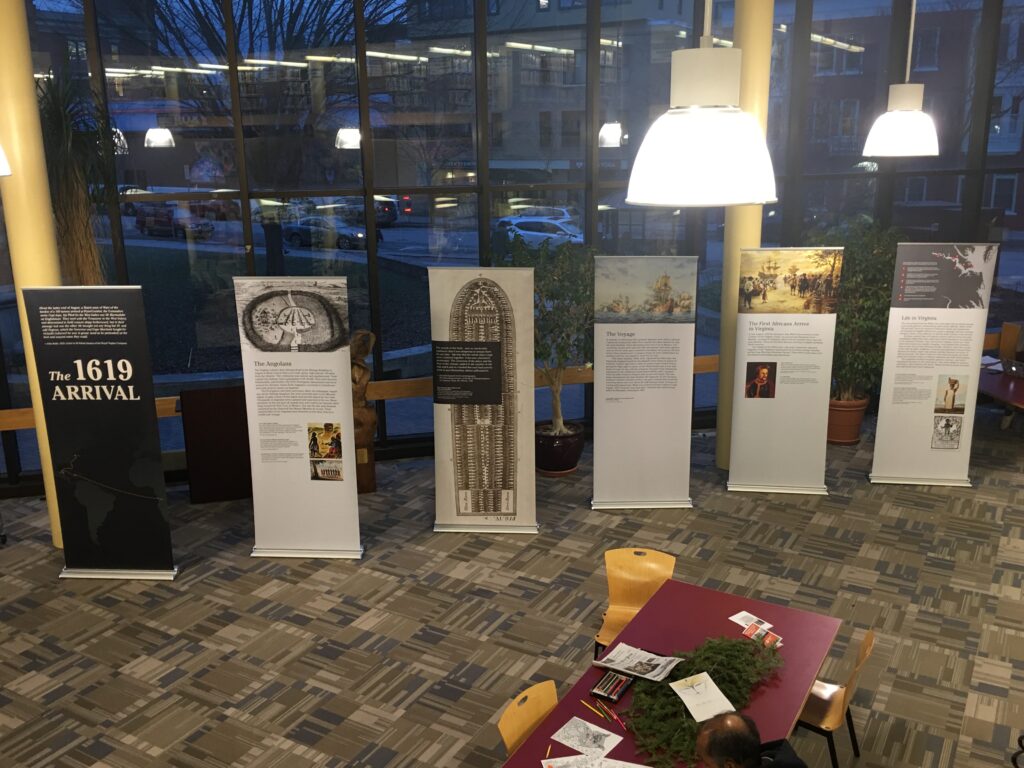1619: Arrival of the First Africans Traveling Exhibit; Turning the Curve on Systemic Racism

FOR IMMEDIATE RELEASE
November 18, 2021
Contact: Isaac Owusu,
info@vtracialjusticealliance.org
1619: Arrival of the First Africans Traveling Exhibit; Turning the Curve on Systemic Racism
(Burlington, VT) — Today the 1619: Arrival of the First Africans Traveling Exhibit will go on display at the Fletcher Free Library. Drawing on the latest research, this exhibit tells the story of the Africans’ home in Angola, how they came to be enslaved aboard the Spanish slave ship San Juan Bautista, the terrible 10,000 nautical mile voyage that brought them to Virginia, and their lives on the farms and plantations in the new colony. This Vermont Racial Justice Alliance outreach and education initiative is to educate the public about the arrival of Africans to the “English Colonies” and highlight their contributions and resilience. This exhibit will also enable the community to realize the impact that slavery has had (and continues to have) on our laws and institutions.
The Fletcher Free Library will also host the Vermont Racial Justice Alliance’s Turning the Curve on Systemic Racism: Building Back a Healthier Vermont, a presentation, panel discussion and Q/A session today at 6:00 PM (hybrid). The campaign provides community training on systemic racism and offers businesses, agencies, municipalities and other organizations an advisory and guidance on implementing a transformational, data driven, programmatic approach to eradicating systemic racism and will offer micro-summit follow-on activities in the coming months.
“It is my hope that through the forthcoming workshop/lecture series and the state’s ongoing policy work, that we will put the spirit of the Resolution into practice and continue the heavy but necessary work of broad education- on what justice could and will look like,” Xusana Davis, Executive Director of Racial Equity said on a joint legislative resolution proposed by the Vermont Racial Justice Alliance, relating to racism as a public health emergency earlier this year.
Turning the Curve is an intentional implementation action to follow through on the passage of that joint legislative resolution that commits the legislature to “sustained and deep work of eradicating systemic racism throughout the State, actively fighting racist practices, and participating in the creation of more just and equitable systems… and coordinating work and participating in ongoing action, grounded in science and data, to eliminate race-based health disparities and eradicate systemic racism.”’
Commenting on the joint legislative resolution, Representative Kevin (Coach) Christie, Co-chair of the Social Equity Caucus, said that “racism is the air we breathe. We can’t build on what we don’t know. This is a great opportunity for us to learn more. This is a marathon, not a sprint. Reverend Dr. Christopher Von Cockrell, Board Chair of VRJA, said: “The Alliance continues the work of outreach and education on systemic racism, providing community support and holding up our rich culture. This joint resolution is an opportunity for the legislature to make the commitment to hold themselves accountable to allocating resources and seeing the work through.”
The exhibit will go on display at 3:00 PM and remain at Fletcher Free Library through the 29th of November, at which time it will be located at the Richard Kemp Center for “Community Discussions”. Turning the Curve will be from 6:00 PM till 7:30 PM. Folks are encouraged to register for the event or watch the event on the Alliance’s facebook live channel. Those choosing to attend are requested to wear masks and be mindful of all COVID safety protocols.
This community education opportunity is made possible through a collaboration with the Vermont Racial Justice Alliance, the Hampton History Museum and Fletcher Free Library.
Support for this work and be directed here.
###
About the Vermont Racial Justice Alliance
The mission of the Vermont Racial Justice Alliance is to secure sustainable power, ensure agency and provide security for American Descendants of Slavery (ADOS), while embracing their history and preserving their culture.

 Previous Post
Previous Post Next Post
Next Post